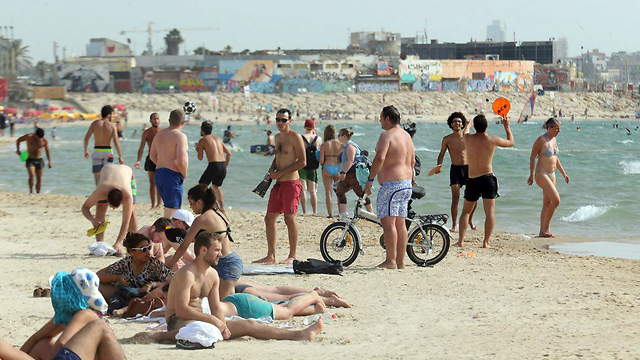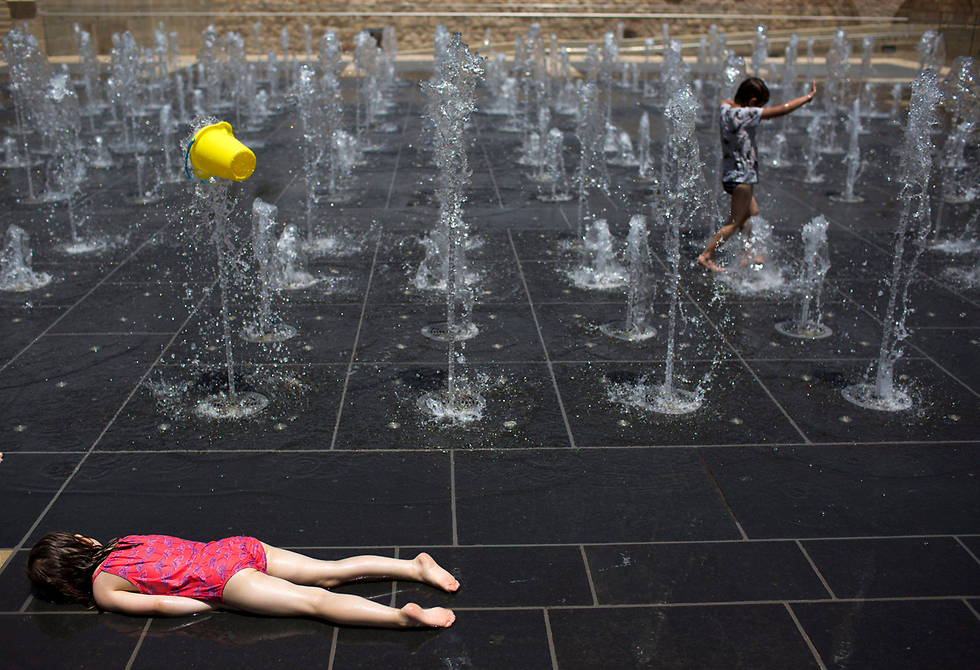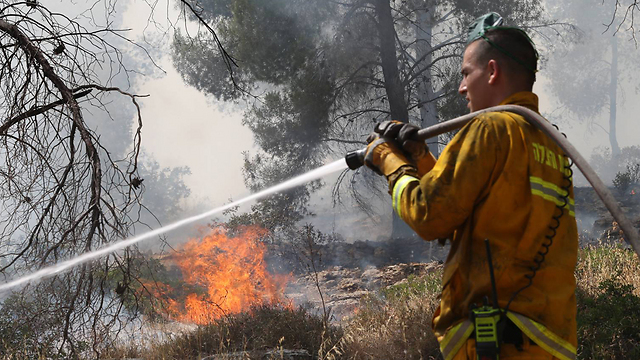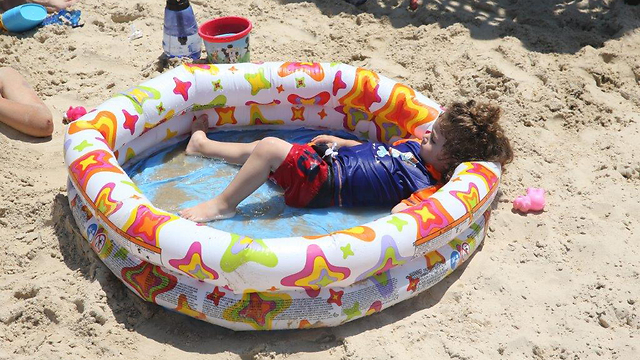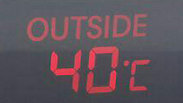
Israel at peak of heat wave
Southern Israel registers highest temperatures on Sunday, with 47 °C in kibbutz Yotvata and 46 °C in the Jordan Valley and Eilat; 442 people treated for heat-related conditions since Saturday morning; firefighters across the country battle blazes.
A heavy heat wave has enveloped Israel beginning Sunday morning and is expected to continue to at least Tuesday.
The record high on Sunday was registered in kibbutz Yotvata in southern Israel that experienced 47 °C with 10 percent humidity, with the Jordan Valley and Israel's southernmost city of Eilat coming in close second with 46 °C and nine percent humidity. Be'er Sheva and Ein Gedi registered 43 °C, while Rehovot and the Shfela region saw 42 °C and Tel Aviv suffered from 40 °C.
Meanwhile, at least 442 people were treated for conditions relating to the extreme heat since Saturday at 7am.
Meteorologist Lior Suderi said that this heat wave is expected to break the 1988 record of extreme heat over a few days in the month of May, adding temperatures on Monday could reach 50 °C in eastern Israel.
Meteorologist Dr. Baruch Ziv explained that the current heat wave is considered a "subsidence heat wave. It's caused by the sinking of higher air levels, which is a slow process when the area has a high pressure system, which is semi-immobile. It takes time, and it cooks, quite literally, for a few days. Actually, on Independence Day, we were in its initial stages, but in most parts of the country, it wasn't felt. And since then, it's only gotten hotter."
Ziv further addressed the irregularity of such high temperatures in May. "It's extremely hot. We don't reach such temperatures and for so long every year. We're at the peak of an eight-day heat wave," he explained. "The temperatures in Israel's hot season rose by two degrees over 40 years. Our climate is already changing, and it's going to change further. Coping with it is done by air conditioning, and as a result, there's a rise in electricity demand, and the implication is that the Earth gets warmer."
The meteorologist predicted that the upcoming summer will not be easy, after last year's unprecedented heat. Although he stated that "the technology is still not advanced enough" to predict if the upcoming summer will surpass last year's, Ziv did forecast that the country could expect extremely high temperatures.
The scorching heat caused several fires in several places across the country, among them: in an open area in the neighborhood of Kfar Shalem in Tel Aviv; at the IDF's Camp 21 base near Kfar Yona; in the wadi between the Shuafat refugee camp and Pisgat Ze'ev in Jerusalem; near the moshav Luzit and another near the moshav Mata, both in the Beit Shemesh area; near the town of Abu Ghosh not far from Highway 1; at a Christian YMCA guest house in the Kinneret; and in the neighborhood of Neve Sha'anan in Haifa.
Firefighters were fighting the blazes throughout the day, with some being put out and some still ongoing. None were hurt in any of the fires, but extensive damage was caused by some of the fires.
The Fire Department is investigating a suspicion that the fire in Jerusalem was caused by a Molotov cocktail (firebomb) thrown from the Palestinian refugee camp at the Jewish neighborhood.
The Israel Electric Corporation is also preparing for the heat wave and the higher demand that it brings. They decided to postpone disconnecting delinquent customers until the end of the current heat wave. The electricity demand in Israel reached its peak on Sunday at 3:26pm with 11,349 MW used. The previous peak demand for the month of May was last year at 11,332 MW.
In preparation for this summer, the corporation carried out maintenance and improvements on the electrical system throughout the country over the past months. The corporation's CEO, Ofer Bloch, said, "The Israel Electric Corporation prepared in recent months to meet the supply of electricity during peak demands in the months of summer 2016. We are available to the public via our Facebook page, our website and our 103 telephone line."
The extreme heat will continue into Monday in the mountains and internal parts of the country. The peak temperatures are expected to reach 45 °C in the shadow in the Ein Gedi area. The coastal area is expected to be "cooler," with "only" 35 °C expected in Tel Aviv.
On Tuesday, the heat wave is expected to break, and temperatures are expected to drop drastically. However, they still will be higher than is regular for the season. By Wednesday, temperatures will further drop to what is considered regular for the season.










